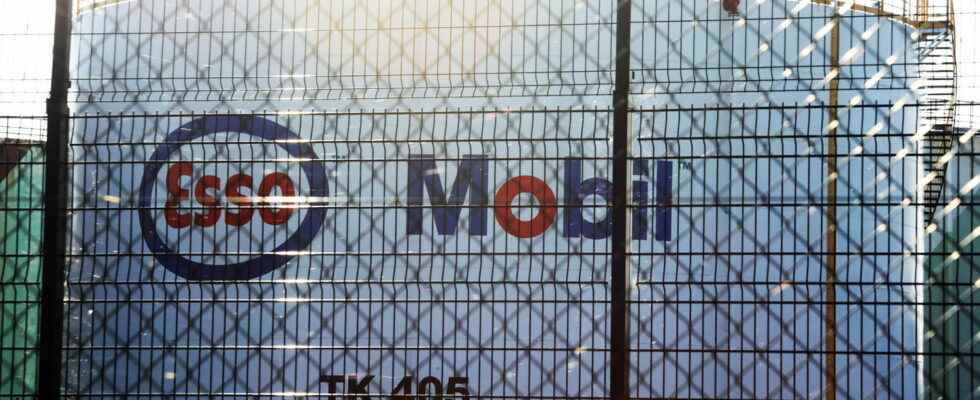ESSENCE. The government decided to requisition an Esso refinery to relieve the shortage of gasoline at service stations. Will the measure be sufficient? Who will be requisitioned? How long ? We take stock.
[Mis à jour le 12 octobre à 15h24] Faced with the refinery strike and the continuing shortage of petrol at stations, the government has decided to requisition a first refinery this Wednesday, October 12. The establishment of Esso-ExxonMobil in Seine-Maritime is targeted and the procedure must take effect during the day, according to the Ministry of Energy Transition, despite the mobilization and disapproval of the unions. The Norman refinery is one of the six to be affected by the strike but the only one whose restart is forced, yet the executive does not rule out “resorting to additional requisitions” under the same conditions as in Gravenchon -Port-Jérôme as Olivier Véran said after the Council of Ministers on Wednesday. The government spokesperson supported the benefits of the measure, citing a rapid effect, in particular a “very significant improvement” in the stations thanks to the resumption of deliveries of fuel in “the next few days”. Because yes, the requisition of the refinery and its start-up at minimum service will not allow a return to normal in petrol stations overnight. Olivier Véran added that later the restarting of refinery production will be allowed thanks to the release of storage spaces, but for production to resume again the strike must end.
The unions do not seem determined to end the strike in the refineries. Many do not see favorably the requisitions decided by the government, some even consider that it is an attack on their right to strike. However, the executive is within its rights, that permitted by thearticle L2215-1 of the General Code of Local Authorities according to which “when the observed or foreseeable attack on good order, health, tranquility and public security so requires […] the prefect may, by reasoned decree, […] requisition any property or service, require any person necessary for the operation of this service or the use of this property and prescribe any useful measure until the breach of public order has ended or until the conditions of its maintenance are ensured.” The shortage of gasoline which affects 30% of French stations is, according to the government, a disturbance to public order sufficient to justify this measure.
Sufficient requisitions to end the gasoline shortage?
The shortage of petrol at service stations is a direct consequence of the refinery strike, but it is not enough to get the establishments running again for the problem to be instantly resolved. The requisition of the Esso-ExxonMobil refinery in Normandy will not be the miracle solution to the difficulties of motorists, but the resumption of fuel distribution could relieve the pressure on petrol stations within a few days, while the petrol and diesel are delivered and replenishment is more regular. But if it is restarted, the refinery will not run at full speed, only the distribution activity will resume. However, to see a real return to normal, all the refineries (there are eight in France, including seven in mainland France) would have to restart and even there motorists would have to wait ten days to no longer have difficulty refueling.
Who will be requisitioned in the gasoline refineries?
The Esso refinery in Seine-Maritime, the only one to be affected by the measure, will not be running at full speed even once the requisition of personnel “essential to operation” has been recorded. First, because only a handful of employees are targeted by the measure. As specified, only the personnel assigned to the missions necessary to solve the supply problems will be called upon to work, so it is a question of a few people, two to three per site depending on TF1 News and always less than ten according to BFM TV. Then the low number of employees mobilized is explained because it is not all the activity of the refinery which will be relaunched but only “the unblocking of the fuel depots inside the refineries” notes the management of Esso at theAFP. The production units will remain shut down and the employees will simply work to send gasoline to the stations.
As for the selection of requisitioned employees, it is nominative and is always done according to the criterion of necessity, information that the prefecture obtains directly from the company. For these people, the prefectoral decree makes work compulsory at least for the missions and services specified in the text. In the event of “refusal to carry out the measures prescribed by the requesting authority”, the employees expose themselves to a sanction of up to “six months’ imprisonment and a fine of 10,000 euros” according to Article of the General Code of Local Authorities. The duration of the requisition may be indicated but the measure lasts until the breach of public order is resorbed. As for the date on which the requisitioned personnel must start working, this can happen very quickly and only take place a few hours after the publication of the decree.
